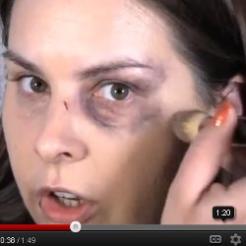'Viral' is a modern day word for 'success' says Niki May Young, who celebrates the achievements of Refuge in its hard-hitting film featuring a make-up lesson for abused women.
If you want to succeed, it's a good idea to piggy-back off someone who already has. It's the same ideology that revived Peter Andre's career in the UK, and propelled former Playboy bunny and now Towie star Chloe into the public sphere. But it takes a savvy and forward-thinking charity to realise that celebrities are no longer just on your TV screens or in your magazines, they're on YouTube too.
So Refuge should be applauded for their canny move in asking make-up artist to the YouTube audience, Lauren Luke, to front their latest campaign to combat domestic violence - 'Don't cover it up'. Their reward of going viral, with almost 500,000 hits in one week, and coverage on Sky News, Channel 5 news, Telegraph, Guardian, Huffington Post, gossip magazine Jezebel, and of course civilsociety.co.uk, is well deserved.
Not only is Luke a YouTube sensation with over 440,000 subscribers to her make-up lesson vlog, the Geordie lass proves herself the perfect person to front the campaign, showing an aptitude for acting and empathy in her all-too-believable depiction of a woman covering her bruises and cuts after being beaten by her partner in 'How to look your best the morning after'. The juxtaposition between her calm nature as she describes how best to cover your bruises and scrapes, and the distressing scenario make the film all the more poignant.
The result is a provocative film portraying the lengths that some women will go to to cover up the fact that they have been abused. It's sudden and chilling conclusion alludes that you can cover up the bruises, but the abuse will only continue if you don't seek help.
Abuse is invisible
The film makes visible a social condition that is systemically invisible. While Refuge states that one in four women in the UK will experience domestic violence in their life, there are no accurate figures available. The degrading nature of abuse, its attached humiliation and fear of retribution if brought to the surface, and a fear that they won't be believed prevent sufferers from coming forward. But there is also a lack of consensus over what constitutes domestic abuse. In 2008 the Home Office released a report into domestic abuse and offered no clarification on figures saying: "There are no data on general incidence of domestic violence in the UK. Analysing statistics on the incidence of domestic violence and the impact of interventions is a complex task. Some definitions and data include only intimate partner violence while others include both intimate partners and other family members.
"Only a tiny proportion of victims ever come into contact with statutory authorities, particularly criminal justice agencies, making measurement of the scale of abuse even harder."
What this film does instead is bring the issue to the fore, in a format that can be accessed anywhere, and remind those who are suffering that people care - the phenomenal success of the film is testament to that - and that there is help available.
Help for those affected
Domestic abuse can affect anyone of any gender, race or social background. Refuge offers a number of resources for those suffering abuse.
Abuse is not only physical but can be emotional or financial too, and can lead to you doubting yourself, or fearful of reaching out to friends or family. Refuge's checklist for recognising abuse helps to identify some of the behaviours that relate to abuse and encourage you to seek help.
Women suffering from abuse can go to this link to receive help.
Men suffering from abuse can go to this link to receive help.
Refuge also offers help for abusers, in a section that hopes to help those who recognise their abuse re-learn their behaviours.
Every week civilsociety.co.uk features a new film as an example of best practice in film production by charities. If you have a film that you would like to share with the charity community send an email to [email protected] for the chance to be showcased as Friday's featured film.










